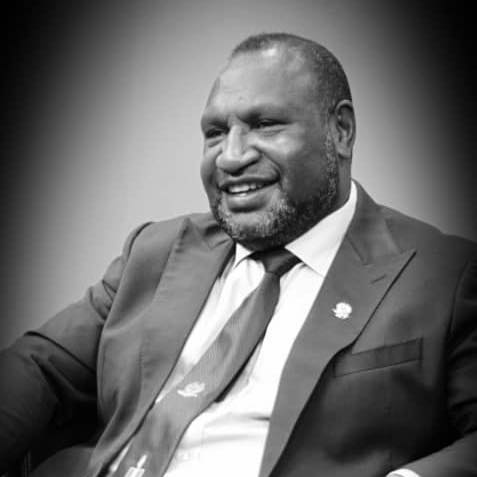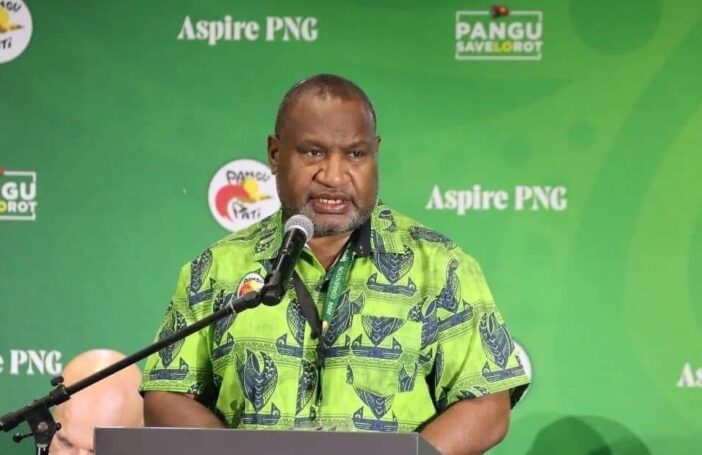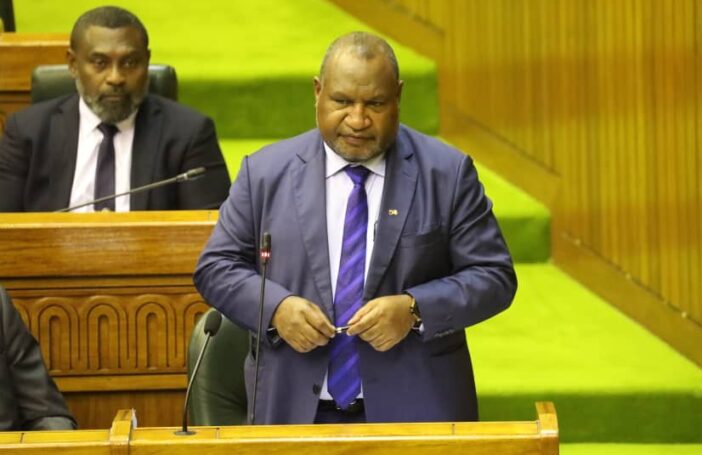The Papua New Guinean Supreme Court ruled this week that PNG’s Parliament will return on 14 December 2020. Now that a possible vote of no confidence against Prime Minister James Marape looks likely, I ask: how can PNG change its prime minister?
Outside an election, a vote of no confidence is only one such mechanism. PNG’s constitution provides for the dismissal of the prime minister from office for breaching the Leadership Code (s. 142(5)(a)), removal from office on health grounds (s. 142(5)(c)), suspension from office pending an investigation (s. 142(6)), as well as removal through a vote of no confidence (ss. 105 and 145). A vacancy can also occur if the prime minister resigns, dies or has his election invalidated by the courts.
Since PNG’s independence, no prime minister has been dismissed from office for breaching the Leadership Code, though, in 2011, Michael Somare was suspended for two weeks as PM for his failure to submit complete annual returns to the Ombudsman Commission.
No PM has died in office. Michael Somare was removed by Parliament for being unfit when he was undergoing medical treatment in Singapore in 2011. The Supreme Court ruled his removal unconstitutional since expert opinion was not sought. But Parliament ignored the ruling.
There have been numerous challenges to the validity of a PM’s election on the floor of Parliament, including Marape’s own election, but the Court has only ruled one election invalid. On 23 September 1993, as the 18-month grace period was coming to an end, Prime Minister Paias Wingti secretly resigned, hoping to be re-elected the next day and enjoy a fresh 18-month grace period. When Speaker Bill Skate announced the vacancy and call for nomination the next day, Opposition MPs protested and left the chamber. Government MPs proceeded to elect Wingti as PM. A year later, the Supreme Court ruled the re-election of Paias Wingti to be invalid.
Now we come to votes of no confidence.
In total, since independence, PNG has had nine prime ministers elected on the floor of Parliament following a general election, but only two have completed their terms: Michael Somare (2002 to 2007) and Peter O’Neill (2012 to 2017). As mentioned above, Somare was replaced by Peter O’Neill in 2011 on the disputed grounds of ill-health. Three PMs have been replaced through votes of no confidence (Somare by Julius Chan in 1980, Somare by Wingti in 1986, and Wingti by Rabbie Namaliu in 1988) and three others resigned to avoid a vote of no confidence (Wingti in 1993, Skate in 1998 and O’Neill in 2019).
Section 145 of the Constitution provides for a vote of no confidence against the prime minister, with two different sets of provisions: first, for a vote of no confidence conducted within the first four years following the election of the prime minister; and second, for a vote of no confidence within 12 months before the issue of writs for the next election.
If the vote of no confidence is within the first four years the alternative PM needs to be named. If it is within the last year an alternative must not be named, since, if the vote is successful, Parliament will be dissolved and an election held.
The notice for a motion for a vote of no confidence must be signed by one-tenth of the MPs (at least 12 out of 111 MPs). It then goes before the Private Business Committee (PBC) for vetting. The notice should include the name of the alternative PM (if within the first four years). Once the PBC is satisfied that the required procedures have been followed, the motion is then listed on the notice paper. The next day the Speaker announces to Parliament that a vote of no confidence has been moved against the PM. Parliament is adjourned for a week and then proceeds with the vote of no confidence.
If the vote of no confidence is within the first four years, MPs vote (in a single vote) either for the alternative PM or the incumbent. Whoever gets the most votes becomes prime minister. In a vote of no confidence within the last 12 months, Parliament only votes for or against the incumbent PM. If there are more votes against than for, Parliament is dissolved.
This process can be delayed if government MPs dominate the PBC. This is why the Opposition voted to reconstitute the PBC with its supporters on 13 November. The government reversed that decision on 17 November when Opposition MPs were absent, but the Supreme Court has ruled all decisions of 17 November were invalid, which restores the PBC back to the Opposition’s control. From past experience, the vetting process can be done in a day if the PBC is supportive.
What all this means is that the Opposition will need to nominate a leader by Monday, 14 December if it plans to table its motion of no confidence as soon as Parliament resumes. If it does so, the critical showdown between the current PM and the nominated alternative would then take place the following week.
Of course, it might take much longer to organise than that. However, as noted in an earlier blog, due to the high turnover rate of incumbent MPs, politicians have historically been reluctant to institute a vote of no confidence within the last 12 months of a parliamentary term as, if they are successful, elections are brought forward. This gives the Opposition until 30 July 2021 to try to change the prime minister.





Thank you so much for sharing this very valuable information here.
It’s really helpful for some of us to fully understand the content relating to the appointment of prime minister in our political system.
Really appreciate it!!
Hi Michael,
Thank you for the article. One question regarding the alternative candidate named on the motion paper. The constitution implies in section 145 that it can be substituted. I cannot quite understand the process. Can the nominee be substituted on the floor of parliament? Does the mover of the motion have to nominate the person named or can that person refuse the nomination on the floor and another be nominated?
Hi Fraser
This is very good question for public consumption.
To answer this question, the person named as next Prime Minister will not be substituted with any other person in the floor of the parliament in respect of the name of a person nominated as alternate Prime Minister. This in line with section 145 (3): “A motion of no confidence in the Prime Minister or the Ministry moved in accordance with subsection (2) (a) may not be amended in respect of the name of the person nominated as the next Prime Minister except by substituting the name of some other person”. This means there cannot be nomination during the VONC, both government and opposition bring the numbers on the floor of the parliament to vote….
Hi Michael,
Thank you for the informative sharing on the processes involved in VONC.
May I seek your opinion on the current VONC taking place this year 2024?
Do you think the VONC should take place without any hinderance? (please state your reasons)
So insightful. Thank you for putting things into perspective.
I have a question I would like to ask.
If an election is triggered by a vote of no confidence before the 5th anniversary of Parliament, does the constitutional requirement for an election on the fifth anniversary of Parliament still hold?
1. Dissolution of parliament within the last 12 months will only be triggered if there is a ‘successful’ vote of no confidence (VONC). There has been no attempt at VONC within this time frame since independence. Attempts for a VONC ceases when the last 12 months is reached.
2. A caretaker government manages the affairs in the event there is a successful VONC within 12 months.
3. The country goes for a general election after parliament is dissolved.
As stated in the article, a no confidence vote as never been moved within the last 12 months of the parliamentary term. The high incumbency turnover rate means politicians don’t want an early election.
It also demonstrates that vote of no confidence is never about good governance, or replacing an irresponsible (corrupt) government. If that were so, there would be push for a VONC even within the last 12 months – politicians don’t become corrupt-free within last 12 months.
VONC is nothing but an attempt by those who don’t have access to state resources (opposition) to replace those who do (government). VONC within last 12 months doesn’t benefit either even the opposition.
Thank you Michael for this well-laid-out explanation of the processes involved in motion of no confidence. This is good information for public awareness as we embrace possible VoNC in February this year, 2024.
A great piece explicitly laid out, highlighting the progressive invention of newer and clever ploys to maintain political power via MP numbers and abuse of positions.
Apparently, Democracy is not guarded by the rule of Law, rather numbers tend to dictate political outcomes.
you are right bro, these leaders are more on personal interest not people’s interest. total power hungry ones….
great bro
Thanks Mike, bad precedent set by parliament, running to court seeking interpretation.
Michael, this is a great piece. I did manage to pick out an institutional and procedural sway regarding your piece. This is interesting since it goes to the heart of defining and explaining PNG politics with regard to the issue discussed. Great job.
Really appreciate the post as it clarifies doubts clouding around the happening with parliament sittings and the judiciary
I totally agree Mike, well said and explained. I really think the courts court’s interpretation SHOULD run parallel with much COMMON SENSE on such legal interpretations. Its appears so real and evident that those judges will always side and support the CORRUPT leaders as always been each case since.
Thank you for the historical information and the VONC process, Very educational. 😍👑🙏🙏
An investigative analysis. I did not only enjoy the read, I learnt alot of complex parliamentary processes eloquently explained in brief understandable piece. The author is without doubt the best political analyst in the making.
Thank you indeed, Mike for throwing light on the current political fiasco which, without any element of ambiguity seeks to demonstrate the glaring need for all our MP’s to fully acquaint themselves on such necessities as parliamentary rules (if any) as to guide ethical behavior in the conduct of the performance of their mandated duty during sittings of parliament including full understanding of what is required to be observed and guided by in terms of following its processes and procedures and importantly to know and have some understanding of the laws governing those functions for example the standing orders, the votes of no confidence, the calling of parliament, the roles and responsibilities of the speaker, the constitutional provisions relating to the national parliament, the ministerial duties, roles, functions and responsibilities of office etc etc. If they fail to understand the laws and lift their game, they will continue to run to the supreme court every time “like naughty kids run to their Dad (court)” for correction.
Thanks Michael for this valuable historical information.
I have never trusted these clown human judges and will never believe in any any of their judgements. This justice department should be demolished. The money wasted on this department should be used in other critical areas. I have witnessed a lot of cases where normal judgement is clouded with deceitful intentional assumptions and punishment.
Thanks Dac Mike for the history and explanation of the VONC process. Very educational read. Much appreciated.
Thanks for mind settle attribution…courts will never ever come up with sensible decisions. The court will always support corrupt politicians, but God will always reveal the truth at the end of everything. There is a light at end of the tunnel.
Thanks Michael for this blog.
One trend currently taking shape is; the Parliamentary situation in which either the Opposition or Government team seeking court interpretation on basic Parliamentary processes and procedures like the application of Standing Orders during sitting times is a bad precedent.
It is like asking the headmaster of a school to come into a classroom and reiterate the classroom rules to the pupils instead of the class teacher.
Let’s hope better for the future.
I agree. When a court rules 5-0 (which they did in the last two cases) it shows how silly the arguments were in the first place. The parliament is developing a habit of running to the courts, and when courts rule against one party that party cries about separation of powers. The parliament is effectively making the judiciary the supervisor. Some things need common sense more than legal interpretation.
Now the government is contemplating applying for the slip rule. Which is an urgent application for the court to review its decision, but will not change the substantive decisions. They know that, but they may go ahead anyhow, purposely to delay a vote of no confidence. It’s a mess.
Agree with you on that, “some actions need common sense more than legal interpretation”.
Thank for sharing this. Really appreciated, Michael.
Kind regards